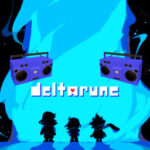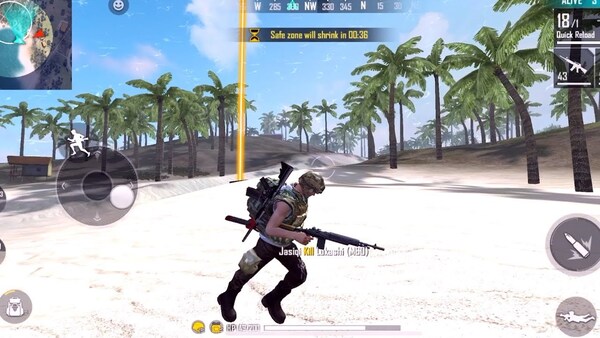Popular Now
DELTARUNE, created by Toby Fox, blends emotional storytelling with innovative RPG mechanics. One of its standout features is its unique combat system, which combines real-time bullet-dodging with turn-based strategy. Unlike traditional RPGs, DELTARUNE encourages players to explore non-violent solutions, build character synergy, and survive elaborate enemy patterns.
This guide walks you through how to master DELTARUNE’s combat system — from basic mechanics to advanced techniques — helping you navigate battles, avoid unnecessary damage, and decide whether to fight, spare, or talk your way out of conflict.
Understanding the Combat Interface
When a battle begins in DELTARUNE, you’re presented with a split-screen interface that resembles classic RPGs but includes real-time elements.
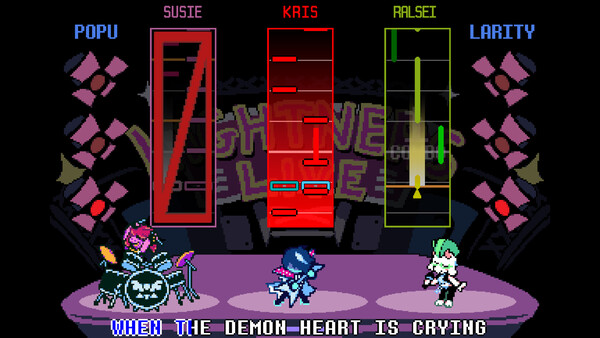
Turn Structure
Each round includes:
-
Player phase: Choose actions like Fight, Act, Magic, Item, or Spare
-
Enemy phase: Survive bullet-hell style attacks while in the dodging box
Unlike other RPGs, movement during the enemy phase is essential. Dodging well reduces or eliminates incoming damage, adding a layer of arcade-style reflex gameplay.
Key Interface Elements
-
HP Bar: Each party member has their own health pool
-
TP Meter: Used for casting Magic — filled by grazing bullets
-
Commands: Options include Fight, Act, Magic, Defend, Item, and Spare
Mastering the interface is the first step toward building consistent battle strategies.
Learning the Difference Between Fight and Act
DELTARUNE allows players to either attack enemies traditionally or interact through the ACT system, creating choices between aggression and diplomacy.
When to Fight
Use the Fight option when:
-
The enemy cannot be spared
-
You’re trying a Genocide-style or aggressive route
-
You want to test enemy patterns for rewards or drops
Attacking uses timing-based quick-time events to land critical hits. Well-timed strikes deal more damage.
When to Act
ACT options allow you to:
-
Compliment or calm enemies
-
Disrupt their attacks
-
Trigger unique events
Successfully using ACT often opens the path to Sparing — ending battles without violence. This affects dialogue, story branches, and character development.
Using Defend and Grazing for TP Gain
Unlike typical defense mechanics, DELTARUNE turns defending and grazing into an energy-generating strategy.
How Defend Works
Choosing Defend:
-
Reduces incoming damage
-
Raises your TP significantly
-
Is often used by support characters like Ralsei
It’s best to Defend when:
-
Preparing to cast Magic in the next turn
-
You want to avoid damage while building resources
Grazing to Boost TP
Grazing means intentionally getting close to enemy bullets without being hit. This rewards:
-
Extra TP
-
Faster access to spells like Ralsei’s heal or Susie’s attacks
Elite players learn bullet patterns to graze efficiently and fill their TP bar quickly.
Choosing the Right Character for Each Role
In DELTARUNE, your party members aren't interchangeable. Each character has unique stats, spells, and behaviors.
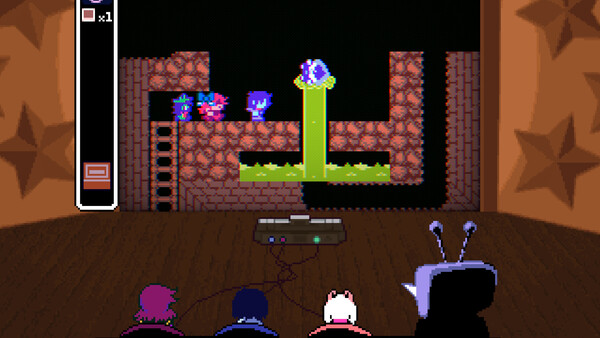
Kris – The Flexible Leader
-
Balanced stats
-
Can Act or Fight
-
Best used as a support pivot or lead attacker
Susie – The Aggressive Fighter
-
Strong physical attacks
-
Can’t Act early in the game
-
Unpredictable: may attack enemies automatically unless warned
Ralsei – The Gentle Healer
-
Focuses on support magic (Heal Prayer, Pacify)
-
Fragile HP pool, so keep him protected
-
Critical for non-lethal victory routes
Understanding your team’s strengths helps in optimizing turns, especially during boss battles.
Sparing vs Fighting: Consequences and Strategy
Whether you Spare or Fight influences the story and character arcs in subtle ways.
Benefits of Sparing
-
Unlocks unique dialogues and story changes
-
Builds relationships with party members
-
Avoids unnecessary EXP, maintaining a low-level run (for challenge)
Benefits of Fighting
-
Grants more Gold (and occasionally items)
-
Speeds up battles if you're confident in damage output
-
Enables an aggressive progression style
However, DELTARUNE encourages morality-based decisions. Choose according to your goals for that playthrough.
Managing Items and Inventory Wisely
Item management is a crucial survival skill in DELTARUNE, especially during long boss fights or no-heal challenges.
Best Practices for Items
-
Carry at least 2–3 healing items at all times
-
Save stronger items (e.g., Top Cake) for bosses
-
Use battle-specific items like Darkburger for high-value healing
Some items may have story effects, so don’t waste them without reading descriptions.
Where to Restock
Vendors like Seam in the Field and Sham in the Castle sell essential supplies. Revisit them before major plot milestones.
Reading Enemy Patterns and Dodging Smartly
Enemy attacks are essentially bullet-hell mini-games. Learning their rhythm is as important as planning your turns.
Tips for Dodging Effectively
-
Stay near the center of the box unless bullets target that area
-
Memorize patterns for bosses (many repeat or evolve)
-
Use small movements rather than big dashes
Bosses like Jevil and Spamton Neo are especially challenging. Practice makes perfect — their patterns become predictable over time.
Using Magic and Special Attacks
Magic in DELTARUNE uses TP and can turn the tide of battle — especially Ralsei’s healing or Susie’s Rude Buster.
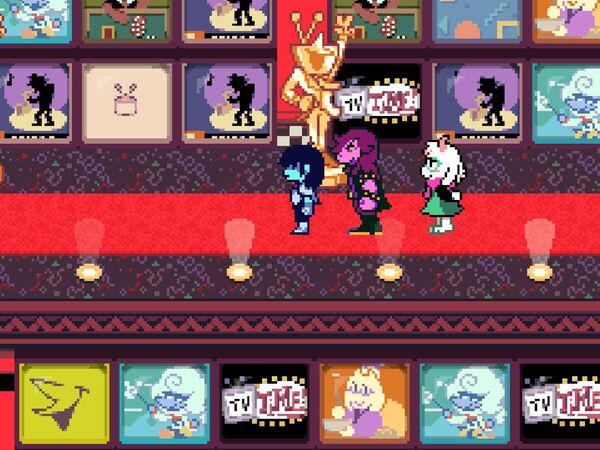
When to Use Magic
-
Heal after group attacks
-
Use Pacify to instantly remove tired enemies
-
Deploy Rude Buster when you’ve built enough TP for a finishing blow
Magic can be combined with ACT strategies — e.g., tiring enemies first, then using Pacify to end the fight.
Advanced Strategies for Boss Battles
Bosses require more than just basic dodging and acting. They push your TP management, timing, and synergy to the limit.
Boss Preparation Checklist
-
Enter with full health
-
Equip gear with defense boosts
-
Stock high-value healing items
-
Understand each boss’s theme and attack types
Study each boss's personality — DELTARUNE rewards players who engage narratively. For instance, singing to a music-loving enemy can weaken their attacks.
Practicing and Improving Through Save Points
DELTARUNE’s save system allows you to retry tough segments without losing major progress. Use this to your advantage.
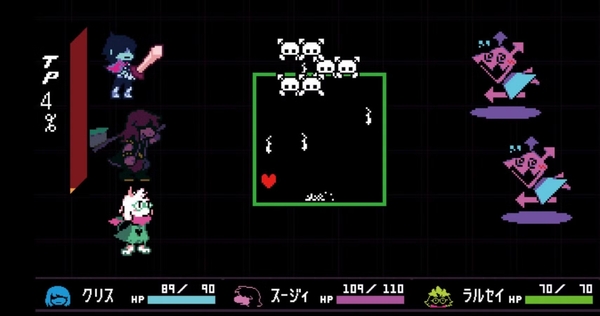
How to Practice
-
Re-enter areas to grind TP skills
-
Replay older fights to test combos
-
Memorize key bullet patterns through repetition
Some players do “No-Hit” or “Pacifist-only” challenge runs, which require near-perfect use of these systems.
Conclusion: Combat Is Choice and Control
The combat in DELTARUNE is not just about defeating enemies — it's about how you choose to win. Whether you want to build peace, master timing-based attacks, or dodge with bullet-hell precision, the system rewards strategic and moral gameplay.
By learning how to balance your party’s skills, manage TP, dodge effectively, and adapt your strategy for every encounter, you'll not only survive — you’ll shape your own path through the story.






